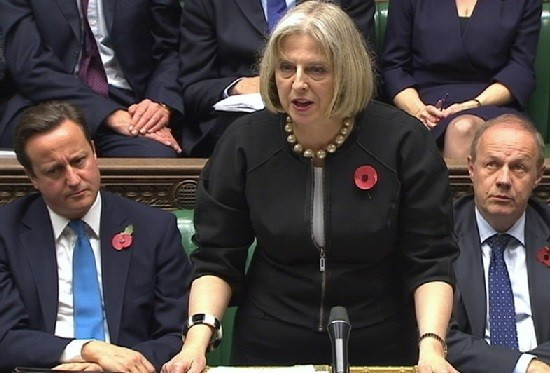Theresa May Plans UK Anti-Slavery Law to Target Human Traffickers

Criminals who traffic human beings into Britain for a life of slavery will face tougher punishments under new anti-slavery laws announced by Home Secretary Theresa May.
Modern-day slave drivers will face lengthy prison terms, while organising slavery would be regarded as an "aggravated" offence, leading to harsher sentences for those with previous convictions, including people trafficking, drug-dealing or organising prostitution.
Those convicted of trafficking would also be banned from working as gangmasters - those who supply large numbers of workers as labour in industries such as agriculture, forestry and food processing.
Those convicted of using abduction, threats or extortion to control slaves would face prison sentences of up to 14 years.
The Modern Slavery Bill will also introduce court orders banning those who traffic immigrants into the UK from returning to areas or businesses in which they worked.
The bill, which has the support of David Cameron, will be introduced before the next general election.
May said trafficking prevention orders would be used to prevent those convicted of involvement in the slave trade from owning a company, or working with children or young women. Blacklists would be circulated to all ports and police forces to enforce the orders.
Companies that use slave labour could be "named and shamed".
A "modern slavery commissioner" will be appointed to oversee the changes.
Writing in the Sunday Times, May said: "The harsh reality is that in 2013 there are people in this country who are being forced to exist in appalling conditions and often against their will.
"Vulnerable people from all over the globe are trafficked into Britain every day. Most end up working as modern-day slaves, without pay, without rights and without hope."
She continued: "Whatever the nationality of the victims, our first concern must be to free them. But in the long term, the only way to minimise the number of victims is to maximise the number of modern-day slave drivers that we convict and imprison."
MPs and anti-slavery campaigners hailed the bill as the first serious attempt to abolish slavery since the campaigning philanthropist William Wilberforce two centuries ago.
Pledging to bring the "despicable criminals" involved in slavery to justice, May added: "It has been a profound shock to discover the extent to which slavery has reappeared in our country.
"We can and we will eliminate it - providing everyone at every level of society does what they can to help. No man, woman or child should be left to suffer through modern slavery."
The home secretary said tackling trafficking would be one of the "highest priorities" for the new National Crime Agency, which will take over from the Serious and Organised Crime Agency in October.
Three years ago, a doctor who smuggled a woman into Britain became the first person to be prosecuted under modern slavery rules.
Campaign groups were appalled when Saeeda Khan, 68, was allowed to walk free from court with a nine-month suspended sentence, after bringing the woman from Tanzania and forcing her to work unpaid for four years.
Human rights charities estimate 1,000 people are brought to the UK to work as slaves each year.
© Copyright IBTimes 2025. All rights reserved.





















